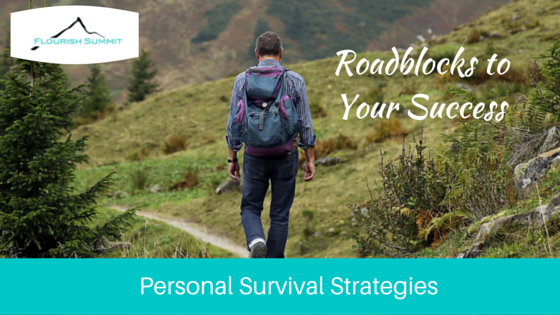One of the most powerful roadblocks to your success can be your personal survival strategy. This strategy remains unconscious until you unearth it, but it pretty much runs your entire life. Your strategy is developed in childhood, often in reaction to a particular situation or person. But as time goes on, this survival strategy becomes generalized to just about all situations and people who might be potentially harmful in any way.
Sometimes the repercussions of this type of roadblock becomes so overwhelming that we self-medicate (alcohol and legal or illegal drugs) to get away from them – all the while not really seeing what part the roadblock has played.
There is an ancient saying that basically declares: If you bring forth what is in you, you will save yourself. If you don’t bring forth what is in you, you will kill yourself.
An important part of “what is in you” is your personal survival strategy, and that strategy is housed in the unconscious. The good news is that we don’t necessarily have to search out our survival strategy by taking our penlight into the cavern of the unconscious. We get a lot of clues about this strategy through patterns that show up in our lives. These are actually our access points to uncovering our roadblocks.
As children, we are thrust into a world with all kinds of real and imagined dangers. We’re too small and too naïve to deal with these threats directly but our little amygdalae are pumped up to help us survive. Though we have limited knowledge of how the world operates and how best to protect ourselves, we are still survival-oriented enough to come up with a strategy to help keep us “safe.” These strategies are developed and firmly in place by the time we’re six or seven years old.
By the time we are adults, our personal survival strategies have become deeply rooted in the unconscious mind. Though we may have a few survival strategies, usually most of us choose one core strategy as our default. Whenever we perceive a threat –BAM! – that childhood strategy leaps up and takes charge often without our even noticing.
So let me ask you: If you as an adult were facing a difficult situation or some type of danger, would you really seek out a seven year old for guidance on how to handle it? Unless that seven year old is the Dalai Lama, probably not.
But in a sense, this is what is happening when your personal survival strategy takes over. This strategy was formed and created by a very young child and, though they may have done the trick during childhood, usually those strategies are not very useful as an adult. But, because your personal survival is so deeply ingrained in the neurology of your brain, it remains powerful and is usually your first and strongest reaction in times of stress.
We all, without exception, developed a survival strategy to cope with life as children. And the vast majority of us have carried that strategy forward as adults. Perhaps your childhood strategy does not have a hugely negative impact on your adult life, but it undoubtedly restricts you in some form.
Makes sense, doesn’t it? How could a four year old come up with a life strategy that will lead to empowering life responses for an adult?
You can get some insight into your survival strategy by asking someone who knows you very well what she sees in you and your behavior, especially in times of conflict or stress. Let me emphasize that this person must be a trusted friend, someone who does not have an agenda or vested interest, someone who is willing to say what she really thinks. What is unconscious to us is often totally obvious to those around us!
